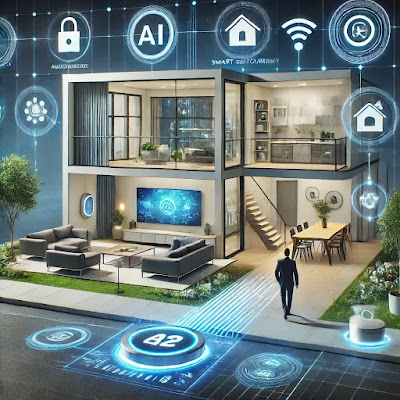1. Introduction
Smart home technology is revolutionizing the way we live, offering increased convenience, energy efficiency, and enhanced security. As artificial intelligence (AI), the Internet of Things (IoT), and automation advance, smart homes are becoming more intuitive and interconnected. This article explores key innovations, challenges, and trends shaping the future of smart living.
2. Key Innovations in Smart Homes
2.1 AI-Powered Home Automation
AI-driven virtual assistants and smart home hubs enable voice-activated and automated control over lighting, climate, and appliances.
2.2 IoT-Connected Devices
Smart sensors, thermostats, and appliances communicate through IoT, optimizing energy usage and improving home efficiency.
2.3 Smart Security and Surveillance Systems
Facial recognition, biometric locks, and AI-driven cameras enhance home security and provide real-time alerts.
2.4 Energy-Efficient Smart Homes
Solar-powered systems, smart meters, and automated lighting reduce energy consumption and lower utility costs.
2.5 Smart Kitchen and Health Monitoring
AI-enabled refrigerators, cooking assistants, and health-monitoring devices contribute to a healthier and more efficient lifestyle.
3. Challenges in Smart Home Adoption
3.1 Data Privacy and Security Concerns
With interconnected devices, smart homes are vulnerable to cyber threats and unauthorized access.
3.2 Compatibility and Integration Issues
Different brands and protocols may not be fully compatible, leading to integration challenges.
3.3 High Initial Costs
Investing in smart home technology can be expensive, limiting accessibility for some consumers.
3.4 Reliability and Connectivity Problems
Dependence on Wi-Fi and cloud-based services raises concerns about downtime and system failures.
3.5 Ethical and AI Bias Concerns
AI-powered home assistants must be programmed to respect privacy and avoid biased decision-making.
4. The Future of Smart Homes
4.1 Fully Autonomous Homes
Future homes will feature self-regulating systems that learn from user behavior to optimize energy use and comfort.
4.2 Smart Cities and Home Integration
Smart homes will be seamlessly connected to smart city infrastructure, improving urban living.
4.3 AI-Powered Predictive Maintenance
Homes will detect and address maintenance issues before they become costly problems.
4.4 Voice and Gesture Control Advancements
Improved voice recognition and gesture-based controls will enhance user interaction with smart devices.
4.5 Sustainable and Eco-Friendly Smart Homes
Green building materials, energy storage systems, and zero-carbon homes will dominate future housing trends.
5. SEO-Optimized Keywords for Smart Homes
- Future of smart home technology
- AI-powered home automation
- Smart security and IoT-connected devices
- Energy-efficient smart homes
- Smart home privacy and security concerns
- Future trends in smart living
- IoT and smart home integration
- Sustainable smart home innovations
6. Conclusion
Smart homes are evolving to become more intelligent, secure, and energy-efficient. While challenges such as privacy concerns, integration issues, and costs remain, advancements in AI, IoT, and automation will continue to shape the future of modern living. As smart cities and homes become more interconnected, our homes will not only be more convenient but also more sustainable and resilient.
Image Suggestion: A futuristic smart home with AI-powered automation, voice-controlled assistants, smart security systems, and energy-efficient features, symbolizing the future of modern living.

